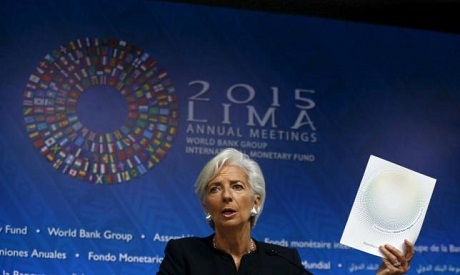
International Monetary Fund (IMF) Managing Director Christine Lagarde speaks during a news conference during the 2015 IMF/World Bank Annual Meetings in Lima, Peru, October 8, 2015. (Photo: Reuters)
The Arab Countries in Transition (ACTs) have had diverging trajectories over the past year and face an uncertain outlook, according to a working paper released Wednesday by the IMF entitled "Arab Countries in Transition - Economic Outlook and Key Challenges."
This paper showed that improvements in the European economy, lower oil prices, and some progress on the policy front have provided tailwinds to growth, which is expected to pick up significantly in Egypt and Morocco.
At the same time, the unemployment rate remains high. Moreover, several of the ACTs have also suffered from intensifying and spreading conflicts that cause widespread human suffering and sizeable economic challenges.
Libya and Yemen are directly affected, while spillovers from these conflicts and the civil wars in Iraq and Syria weigh on Jordan and Tunisia, as well as other countries in the region such as Lebanon, Djibouti, Turkey, and European nations.
These spillovers come most prominently in the form of an influx of refugees, deteriorating security, and pressures on economic infrastructures and labor markets.
All these factors add urgency to the need in the Arab countries to strengthen economic resilience and address long-standing sources of inequity and exclusion.
Coordinated and scaled-up support from the international community will also be critical in stabilizing conditions in the region, addressing the refugee crisis, and securing a more promising economic future for the ACTs in this challenging environment.
Short link: